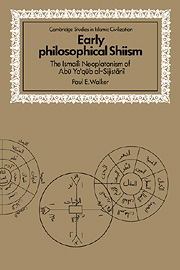Book contents
- Frontmatter
- Contents
- Preface
- Acknowledgments
- Note on transliteration
- List of abbreviations
- PART I AL-SIJISTĀNĪ'S HERITAGE
- PART II AL-SIJISTĀNĪ'S UNIVERSE
- 4 Introduction: categories of thought and terms of analysis
- 5 A theology of unqualified transcendence
- 6 Creation as command
- 7 Intellect, the sum of existent being
- 8 Descending and ascending soul
- 9 Nature and the physical realm
- 10 A cosmic anthropology
- 11 Prophecy, the deputy of intellect
- 12 Interpretation and its institution
- 13 Salvation and the womb of history
- EPILOGUE: THE USE AND CONTROL OF REASON
- Notes
- Select bibliography
- Index
4 - Introduction: categories of thought and terms of analysis
Published online by Cambridge University Press: 02 November 2009
- Frontmatter
- Contents
- Preface
- Acknowledgments
- Note on transliteration
- List of abbreviations
- PART I AL-SIJISTĀNĪ'S HERITAGE
- PART II AL-SIJISTĀNĪ'S UNIVERSE
- 4 Introduction: categories of thought and terms of analysis
- 5 A theology of unqualified transcendence
- 6 Creation as command
- 7 Intellect, the sum of existent being
- 8 Descending and ascending soul
- 9 Nature and the physical realm
- 10 A cosmic anthropology
- 11 Prophecy, the deputy of intellect
- 12 Interpretation and its institution
- 13 Salvation and the womb of history
- EPILOGUE: THE USE AND CONTROL OF REASON
- Notes
- Select bibliography
- Index
Summary
The extant works of al-Sijistānī may be relatively few for a major author, but they nevertheless constitute a rich treasury of ideas and doctrines. In contrast to the small amount of material that survives from his predecessors, a fairly substantial output of books and treatises exists by which to judge al-Sijistānī. This body of writing has not been critically sorted or explored, and must be studied and explained before it can be adequately understood. Such problems are true of the individual treatises themselves as well as for a myriad of specific concepts they contain. Most of al-Sijistānī's ideas have until only recently constituted unexplored territory.
There are, nevertheless, at least two compelling reasons to investigate the thought and major works of al-Sijistānī. One derives from his critical role in the formation of the da ‘wa and its literature at a crucial historical period. The other grows out of his use of philosophical methods, argumentation, sources, and terms as an aid and support in the development of the doctrines of that movement. Most of al-Sijistānī's writings are outstanding examples of early philosophical Shiism. Although many members of the Ismaili da ‘wa – prior to the classical period of Imami theological scholarship – contributed to common debate about the nature of Shiism, al-Sijistānī and al-Kirmnī, attempted more than what ordinarily appears in the theological literature of other Shiite authors – and more than their predecessors Abū Ḥātim and al-Nasafī had been capable of doing.
- Type
- Chapter
- Information
- Early Philosophical ShiismThe Isma'ili Neoplatonism of Abu Ya'qub al-Sijistani, pp. 67 - 71Publisher: Cambridge University PressPrint publication year: 1993

